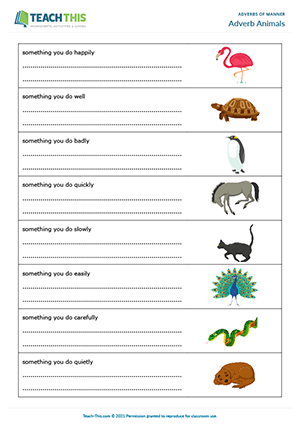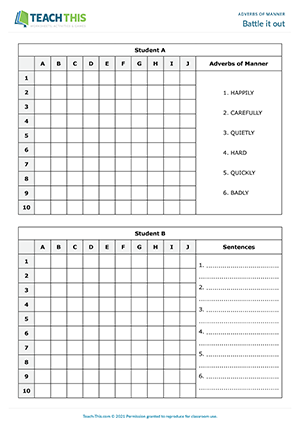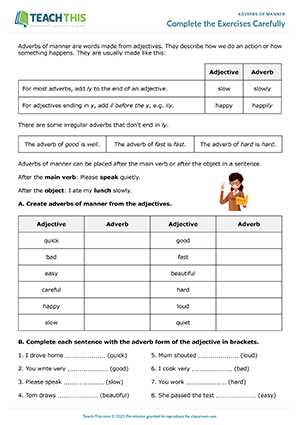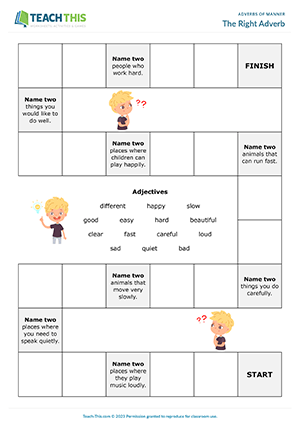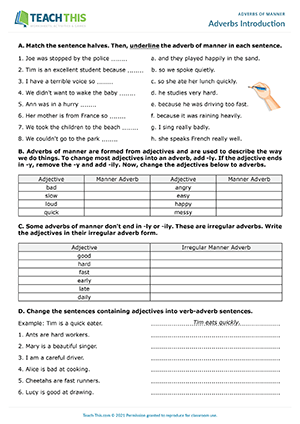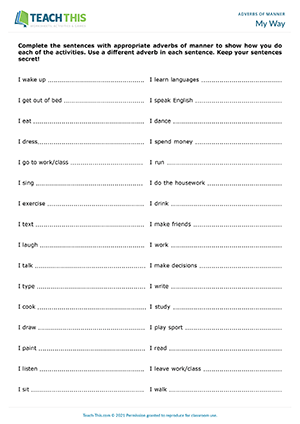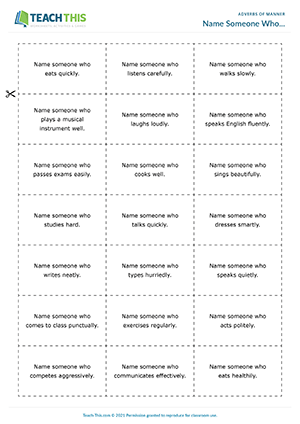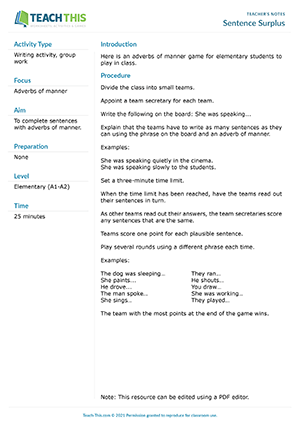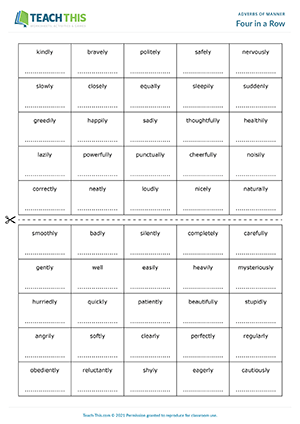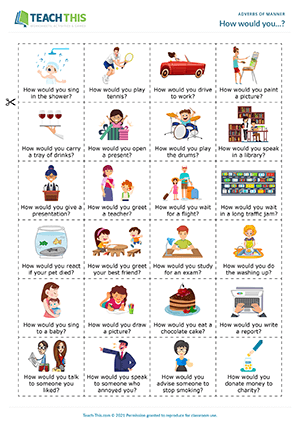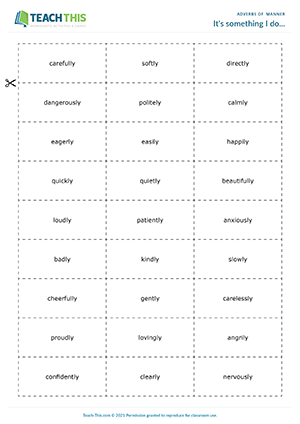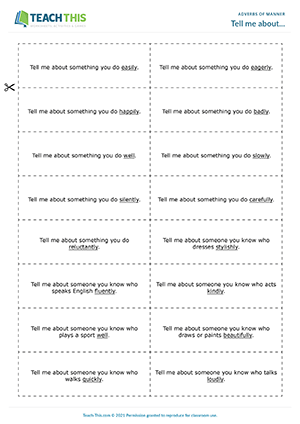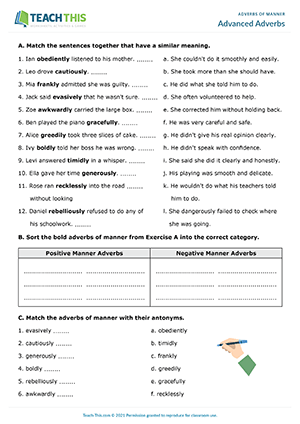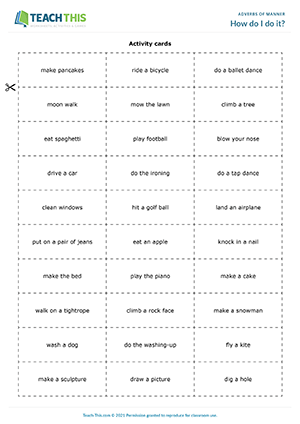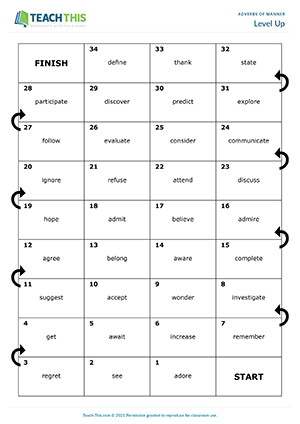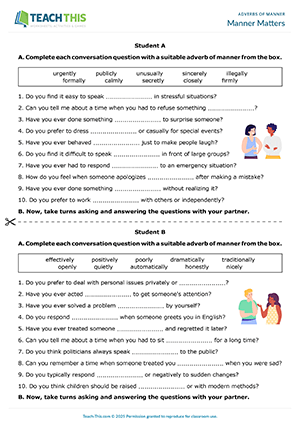In this interesting adverbs of manner activity, students describe an animal by writing sentences with verbs and manner adverbs. Students then guess each other's animals from the sentences. Students begin by choosing an animal they would like to be. Students then write sentences about their animal using verbs and adverbs of manner. Students write as if they are the animal using the first person. Next, in pairs, students take it in turns to read out their sentences to their partner who tries to guess the animal from the description. This process is repeated several times with different partners. Afterwards, students write the sentences again, but this time they write about themselves. Finally, students take it in turns to read a classmate's sentences to the class and they guess who the sentences are about.
Here is a free adverbs of manner game to help students practice basic manner adverbs. The aim of the game is for students to find all their opponent's battleships (adverbs) by calling out coordinates on a grid. If the square is empty, their opponent says 'miss' and the two students swap roles. If the square contains a letter, their opponent says 'hit'. The student then reveals the letter and the other student writes the letter in the square and has another turn. When an adverb of manner has been completely revealed, the student tries to sink their opponent's ship by using the adverb correctly in a sentence. If the sentence is incorrect, the ship won't sink. Only one sentence attempt can be made each turn. When a student successfully makes a sentence, the ship sinks and the student writes the sentence down next to the grid in the space provided. The game continues until one student finds and sinks all six of their opponent's battleships. That student wins the game.
Here is a comprehensive adverbs of manner worksheet to help introduce elementary students to some common manner adverbs. First, students read about how to form and use adverbs of manner. Students then change adjectives in a table into manner adverbs. Next, students complete each sentence with the adverb form of the adjective in brackets. Students then move on to rewrite sentences using adverbs of manner. Afterwards, students find the mistake in each sentence and rewrite it, correcting the mistake. Lastly, students complete sentences with adjectives from a box in their adverb forms.
Here is an enjoyable adverbs of manner board game to help students practice various manner adverbs. In groups, students take turns picking up a card and reading the sentence to the other students using the word 'blank' for the missing adverb of manner, e.g. 'You're walking too BLANK! We'll miss the bus.' The other students listen to the sentence and race to choose an adjective from the game board and say it aloud as an adverb of manner to complete the sentence, e.g. 'slowly'. The first student to say the correct adverb shown on the card rolls the dice and moves their counter along the board. If a student lands on a 'Name two' square, they have ten seconds to name two things corresponding to the prompt to remain on the square. If they are unsuccessful, they move back one square. The first student to reach the finish wins the game. As a variation, students take turns trying to complete a sentence with an adverb rather than racing each other.
This productive adverbs of manner worksheet helps to teach students how to form and use manner adverbs. To begin, students match sentence halves together and underline the adverb of manner in each sentence. Next, students read how to form adverbs of manner from adjectives. Students then practice changing adjectives into adverbs. Students then look at irregular manner adverbs and write adjectives in their irregular adverb form. After that, students change sentences containing adjectives into verb-adverb sentences. Next, students circle the correct adjective or manner adverb to use in each sentence. Students then move on to complete sentences with adjectives from a box in their adverb form. Lastly, in pairs, students complete sentences about how they do things and guess how their partner does the same things. Afterwards, students go through the sentences with their partner to find out how many of their guesses were correct.
In this engaging adverbs of manner game, students guess how their classmates do everyday activities. Students begin by completing sentences with appropriate adverbs of manner to show how they do each of the activities shown on the worksheet. In pairs, students then take it in turns to choose a sentence and say 'It's something I do...' followed by the adverb of manner, e.g. 'It's something I do slowly'. Their partner then guesses the activity by asking a question with Do you...?, e.g. 'Do you get out of bed slowly?' Their partner has five chances to ask the right question. If their partner asks the right question the first time, they score five points. On the second try, they get four points and so on. If their partner hasn't guessed correctly after five tries, the student scores five points. The student with the most points at the end of the game wins.
In this free adverbs of manner game, students name people who perform activities in a particular manner. In groups, students take it in turns to pick up a card and ask the other students to name someone who performs the activity on the card in the manner shown, e.g. 'Name someone who eats quickly'. The other students then race to answer the question by thinking of someone who performs the activity in that particular manner. The first student to answer keeps the card. The other students then ask the winning student follow-up questions to gain more information. The student with the most cards at the end of the game wins.
Here is an imaginative adverbs of manner game for students to play in class. Write a phrase on the board, e.g. 'She was speaking...' The teams then get three minutes to write as many sentences as they can using the phrase on the board and an adverb of manner, e.g. 'She was speaking quietly in the cinema'. When the time limit has been reached, the teams read out their sentences in turn. Teams score one point for each plausible sentence. Play several rounds using a different phrase each time. The team with the most points at the end of the game wins.
In this creative adverbs of manner game, students play Connect 4 by associating verbs with adverbs of manner and making sentences with the words. Students take it in turns to choose an adverb of manner from the game board. The student then thinks of a verb that would go with the adverb of manner in the square and makes a sentence with the two words. If a student manages to do this successfully, they win the square. Students must use a different verb each time they make a sentence. The aim of the game is for students to get four squares in a row while at the same time trying to stop their partner from getting four in a row. When a student gets four squares in a row, check their answers. If the manner adverbs and verbs match, the student wins the game. Afterwards, give students a copy of the second game board and have them repeat the game with new adverbs of manner.
Here are two fun adverbs of manner games to help students practice manner adverbs. In groups, students begin by playing a pelmanism game to practice adverbs of manner and their opposites. Students take it in turns to turn over two adverb cards. If a student turns over an adverb of manner and its opposite (e.g. well and badly), the student reads the adverbs of manner aloud, keeps the two cards and has another turn. If the two cards don't match, the student turns them back over. The student with the most cards at the end wins. Next, students play a game where they practice the adverbs of manner by associating them with various imaginary activities. Students take it in turns to pick up a question card and ask the other two students the How would you...? question on the card, e.g. 'How would you sing in the shower?' The other two students then race to answer with one of their adverb cards, e.g. 'I would sing happily'. The first student to choose a suitable adverb of manner and make a sentence wins and can discard their adverb card. The first student to get rid of all their cards wins.
In this entertaining adverbs of manner guessing game, students practice manner adverbs by guessing how a partner does different things. In pairs, students take it in turns to pick up a card and write down an activity they do that matches with the adverb of manner on the card. For example, if a student picked up the word 'badly', the student might write 'I sing badly'. The student then tells their partner the adverb, e.g. 'It’s something I do badly'. Their partner has five chances to guess the activity by asking present simple 'Do you...?' questions, e.g. 'Do you draw badly?' If their partner guesses correctly the first time, they score five points. On the second try, they score four points and so on. The student with the highest score at the end of the game is the winner.
In this free adverbs of manner speaking activity, students discuss various topics using manner adverbs. One student goes first and picks up the top card from the pile and asks the other students the question on the card. The other students in the group then take it in turns to answer the question using the adverb of manner stated on the card. Students give as much information as possible and ask follow-up questions to gain more information. The student who asked the question makes notes on the answers in the space provided on the card. After the topic has been discussed, the next student picks up a card and the process is repeated. When everyone has finished, groups give feedback to the class on their answers.
This insightful adverbs of manner worksheet helps students learn and practice some advanced manner adverbs. To start, students match sentences containing adverbs of manner with sentences that have a similar meaning. Next, students sort the adverbs of manner used in Exercise A into positive and negative manner adverbs. Students then match the adverbs of manner with their antonyms. After that, students complete sentences using adverbs of manner from a box and write two verbs that collocate with each adverb of manner. Afterwards, students choose four of their verb-adverb collocations and use them to write sentences.
In this amusing adverbs of manner game, students mime activities in the manner shown on cards for other students to guess. A student from Team A comes to the front of the class and picks up an activity card and an adverb of manner card, e.g. make pancakes / aggressively. The student then mimes the activity in the manner shown on the adverb card. Team A has one minute to guess the activity and adverb of manner, and make a grammatically correct sentence, e.g. 'He is making pancakes aggressively'. If Team A does this successfully, they score a point. After the time limit has been reached, Team B can try to answer. Afterwards, a student from Team B comes to the front of the class and so on. The team with the most points at the end of the game wins.
In this challenging adverbs of manner board game, students make adverb-verb collocations and then use the collocations in sentences. Write thirty-four adverbs from the game on the board in a random order. Players then take it in turns to roll the dice and move their counter along the board. When a player lands on a square, they choose an adverb from the board that they think collocates with the verb on the square. The player then uses the adverb-verb collocation in a sentence. If a player cannot make a collocation, makes a grammar mistake, or cannot think of a suitable sentence, they go back two squares. The first player to reach the finish square wins the game
In this productive adverbs of manner speaking activity, students complete, ask and answer conversation questions that contain manner adverbs. First, in two groups, students complete each conversation question with a suitable adverb of manner from a box. Next, students pair up with someone from the other group and take turns asking and answering the conversation questions with their partner, discussing each topic for a minute or two. Finally, students share what they learned about their partner with the class.
Latest Free
Resources
- Call and Respond
Business - Telephoning (B1)
Date Added: 24th of March
- Small Talk Techniques
Small Talk (B1)
Date Added: 20th of March
- Jigsaw Reading
Reading Exam Preparation (B1)
Date Added: 7th of March
- Writing Jeopardy
Writing Exam Preparation (B1)
Date Added: 6th of March
- Present Perfect Bingo
Present Perfect Yes No Questions (A2)
Date Added: 4th of March
Latest Member
Resources
- Perfect Punctuation
Writing Exam Preparation (B1)
Date Added: 27th of March
- The Business Networking Challenge
Networking (B2)
Date Added: 26th of March
- Business Telephoning Board Game
Business - Telephoning (B1)
Date Added: 24th of March
- Business Networking Board Game
Networking (B2)
Date Added: 21st of March
- Are You Following Me?
Telephoning (B1)
Date Added: 20th of March



